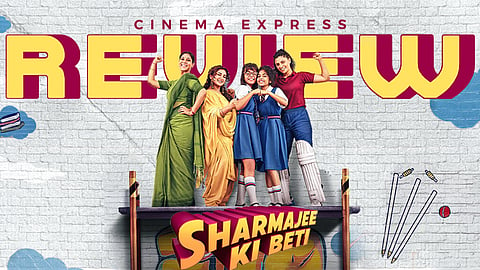Sharmajee Ki Beti Movie Review: Tahira Kashyap Khurrana’s film debut is too facile to leave an impact
Sharmajee Ki Beti(1.5 / 5)
There were moments in Tahira Kashyap Khurrana’s feature film debut, Sharmajee Ki Beti, that reminded me of Satyajit Ray’s striking portrayal of the loneliness of a housewife in Charulata (1964). Both of these films feature upper-class women and their strife to find meaning in the everyday mundaneness of household life as their husbands seem to not care about their solitary existence. There, it was Madhabi Mukherjee’s Charulata; here, it is Divya Dutta playing Kiran Sharma. However, the similarities end right there. There is an absence of sublimity in Tahira’s storytelling; she identifies the struggles of women but fails to weave them into a tale of lasting emotional relief. The filmmaking remains simplistic, restricted only to paying lip service to ‘women empowerment’ while not providing the necessary moments to root for the characters.
While the world around us has still not changed to the degree where all women have the rightful agency over their lives, storytelling has certainly taken a recourse to bring these experiences to the forefront with an urgent appeal. In that way, Sharmajee Ki Beti feels blatantly outdated. Saiyami Kher plays a state-level cricketer, Tanvi Sharma, who is constantly hassled by her actor boyfriend to leave the sport and settle with him. She calmly listens to all the digs he takes at her ‘boyish’ appearance. Both of them behave less like humans and more like characters who are stuck in a world created by Tahira, whose only aim is to show how women have to bear the brunt of such toxic men. Think of Ayub Khan, who played Preity Zinta’s fiance in the 2001 film Dil Chahta Hai. From then to here, the behaviour of men and its caricatured, lazy portrayal, have not changed much.
Starring: Sakshi Tanwar, Divya Dutta, Saiyami Kher, Sharib Hashmi, Arista Mehta, Vanshika Taparia and Parvin Dabas
The film begins by giving an introduction to all the characters, primarily its three protagonists who live in Mumbai and share the same surname, ‘Sharma’. Kiran, Tanvi, and Jyoti (Sakshi Tanwar) face problems in different capacities. Jyoti is a professor at a coaching institute, leaving for work with multiple reminders kept on her phone. Her husband, Sudhir Sharma (Sharib Hashmi), has a night-shift job and hence bears the responsibility of getting their daughter ready for school every day. The daughter, Swati Sharma (Vanshika Taparia), has her own set of problems as she enters adolescence but is excessively worried about not having had her periods yet. She is caught in the middle of her overworked yet loving parents, who she thinks are not paying much attention to her life. Swati internalises patriarchy and lashes out at Jyoti at one point for being a working professional when she could very well be at home and look after the household. The way in which this plays out, however, doesn’t make you stay as much connected with the conflict as it should. It is not about the ‘how’ as much as it is about the ‘what’.
There is also an attempt to understand the internal struggles faced by housemaker Kiran when she finds women around her who are working professionals. It begins with a promising flair yet slowly succumbs to monotony as there are repetitive references as to how people have no time in Mumbai. Kiran daydreams of turning into a superwoman and saving lives or imagines ways of killing her husband when he insults her for being a nobody. It is treated with a magical appeal, yet doesn’t have that enticing quality to it. Things get further awkward when Kiran finds that her husband is cheating on her on their wedding anniversary, as she trails her way to a hotel in a shiny red saree. Her innocence feels out of place and her simplicity is concerning, as there is an entire sequence where she walks back from the hotel as a sad song about tanhai plays in the background.
Facing such insurmountable difficulties, it is unbelievable how the characters deal with everything through an extraordinary sense of calmness. It seems that they are given some agency only in the climax to think for themselves and act on that behalf. Till then, it is too convoluted to care for. The clumsiness is seen even in the performances, as the emotional points are not as carefully designed. Sakshi extends her TV soap aesthetics to the character she plays without much diversion. She does what is needed of her character, which is often not too much. The film doesn’t know what more to do with her authenticity. The same goes true of Divya Dutta, who is too sweet for her own good. The two of them still do the heavy lifting as Saiyami Kher struggles to bring life to her persona. We are told many times that she is a cricketer, but the scenes lack the necessary fervour for us to believe in her passion for the sport.
The list of Prime Video’s latest offerings of women telling women’s stories includes Nitya Mehra’s Big Girls Don’t Cry and Debbie Rao’s Dil Dosti Dilemma, both of which barely scratch the surface. Tahira Kashyap Kurrana’s Sharmajee Ki Beti joins the list. There is little nuance to her craft, which doesn’t believe in thoughtful reflection and merely underlines some pre-existing ‘issues’ faced by women. She lacks the charm to convert her observations about an unequal world into meaningful spectacles.

